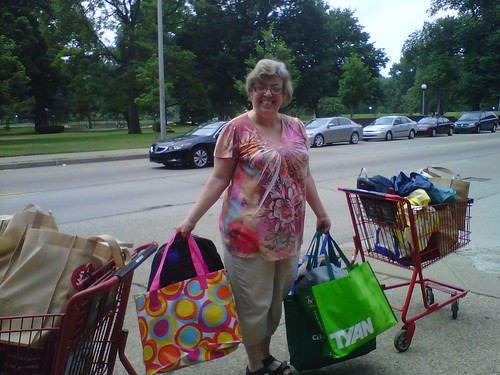
Many nonprofits, particularly smaller organizations, say their biggest challenge to using social media effectively is that they don’t have the time or staff. Those that have opened themselves up to using these tools and connecting with passionate people in their networks find abundance. Here’s one story about how one free agent, a social media savvy volunteer for a local food bank, saw a problem, reached out to her network, and helped solved in collaboration with the local nonprofit.
Sue Kerr has put her social media savvy to work to fight hunger in the Greater Pittsburgh area and save the environment. In 2009, she was live tweeting a food distribution event at the Greater Pittsburgh Community Food Bank when she noticed a man leaving the food bank juggling a lot of thin plastic grocery bags filled with food donations. One bag split and a cabbage rolled out onto the sidewalk and he chased after it.
That’s where she got the idea that food banks should be using canvas tote bags to distribute foods and she tweeted her idea. To her surprise, the Pittsburgh Foundation was following her live tweets. Christopher Whitlatch from the Foundation responded to her tweet with that had a few bags they could donate. Not too long after that, the Pittsburgh Tote Bag Project was launched.
As Sue tells it, “Inspired, I began to reach out to my personal network on Twitter and Facebook and offline through word of mouth. It began informally with a few drives here and there over an 18 month period. I had lots of positive feedback. So, I contacted the Food Bank and proposed we collaborate. We spent some time sorting out the logistics and formally kicked-off on Earth Day.”
The Pittsburgh Tote Bag Project collects gently used tote bags for distribution to the region’s food pantries. They partner with the Greater Pittsburgh Community Food Bank which coordinates distribution of the bags along with food. The Food Bank serves 11 counties and more than 120,000 people each month (about 1.9 million pounds of food) through a network of more than 300 pantries The project receives bags from a network of permanent drop-off spots, informal and formal tote bag drives (with or without food) and corporate donations of excess schwag.
Her partnership with the local food bank has been productive. Says Sue, “The Food Bank has been very supportive and encouraging to our project. They’ve provided logistical and staff support. Through the Food Bank staff, we’ve heard that the pantries love the idea and want as many bags as we can provide. The Pittsburgh Tote Bag Project has collected 5,000+ bags for local food pantries. Says Sue, “We estimate that our project has kept15,000 disposable bags from being used. “
Sue has also collaborated on social media activities with the food bank. Says Sue, “Beyond tagging and shout outs on Twitter, we organized Pittsburgh’s first ever #blogmob (play on flash mob) , inviting local foodie bloggers to come out to the Food Bank for a tour, a chance to observe a food distribution, and general discussion. We plan to repeat every September to honor Hunger Action Month.” Says Sue, “Our hope is to develop a model that can be replicated in other communities.” The project freely shares its lessons learned with other groups that want to run similar drives.
Has your organization discovered and worked with a free agent like Sue?
Beth Kanter is a consultant, author, influencer. virtual trainer & nonprofit innovator in digital transformation & workplace wellbeing.

Leave a Reply